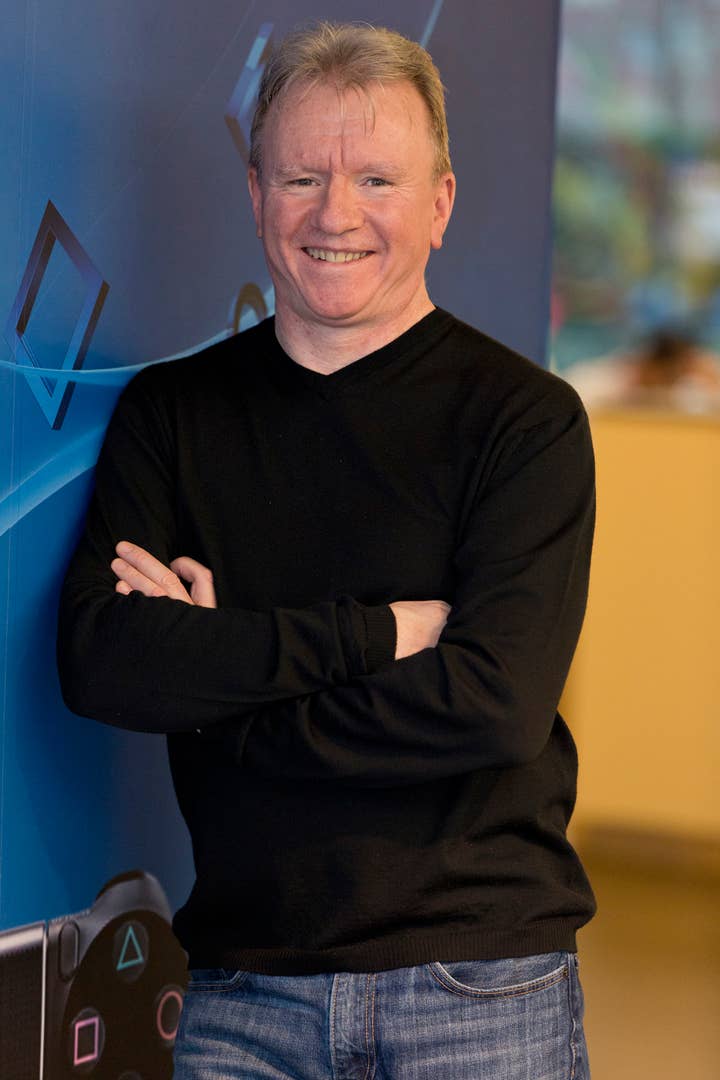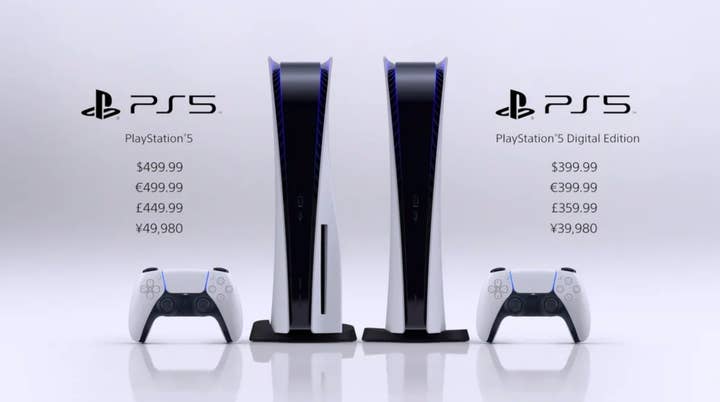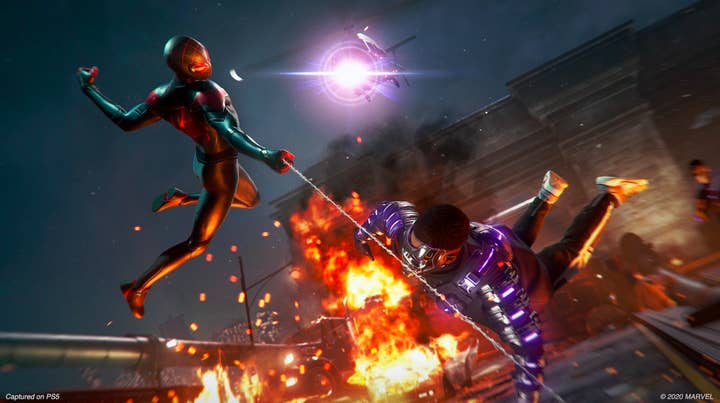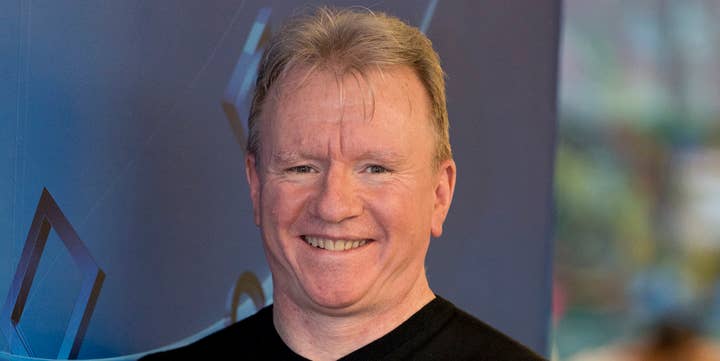PlayStation's Jim Ryan: "We want to give gamers certainty that they're buying a true next-generation console"
Sony discusses the importance of generations, exclusives, and why it's not going after Xbox Game Pass
On its own, there probably isn't too much to say about last night's PlayStation 5 event.
There were a handful of AAA first-party games that will delight Sony's audience, including Spider-Man, Demon's Souls and God of War. The third-party games were all classic PlayStation fare, such as Final Fantasy and Resident Evil. And the price seemed perfectly normal for a new next-gen console. In fact, I'd argue the digital-only PS5 seemed quite reasonable.
Except of course, this PS5 event arrives barely a week after its main competitor made a few surprise reveals of its own. Last week, Xbox grabbed the headlines with its "budget-priced" Series S console, followed swiftly by bolstering its Game Pass offering via a deal with EA.
PlayStation chief Jim Ryan is acutely aware of Microsoft's emerging strategy. Since we last spoke to Ryan, his counterpart at Xbox, Phil Spencer, made comments that played down the generational switch, arguing that it was "counter to what gaming is all about" to force gamers to "buy my specific device on the day I want to buy them." Microsoft has continued the rhetoric since, insisting that its focus is to allow gamers to play its games across a variety of devices.
"All in all, we have tried to minimise or avoid compromises in the architecture of the systems"
It's the opposite to the Sony strategy, and Ryan seems eager to address it with his opening briefing following the PlayStation showcase.
"Seven years now, and a lot happened," Ryan begins. "We've obviously, on the one hand, built this large community. But on the other, there's been a lot of technology changes and advances, which only really interests us in the extent that they enable transformative change in the way that people play and experience games. For us, the time to capture that and to make a big step is with a console transition or platform transition. What we call the generation approach.
"We know it's not the only model, but it is the one that we like. Other models are possible. It is perfectly legitimate to pursue the approach more around the homogenisation of community, homogenisation of gaming experiences. We like to be a bit more nuanced than that, and find a way to give different segments of the community a gaming experience that is more appropriate to their needs.
"What has been key to this has been the emergence over the last years of Worldwide Studios into an absolute powerhouse -- a network of studios making great, great games. We've been quietly, but very steadily, investing in the largely organic growth of that network."

There are two PS5s coming to market this Christmas, but the approach is very different to the one Xbox has adopted. Both PS5 consoles are the same, except one allows you to play discs while the other one does not. Xbox's two consoles are quite different in capabilities: one is a super-powered, fully 4K next-gen machine, while the other has fewer of the advanced features, but at a significantly reduced price. A price that undercuts PS5 by $100.
"In terms of the hardware line-up, the thinking behind it was to try and give gamers certainty," Ryan explains. "Certainty when you look at the SKU configuration. Certainty that they're buying a true next-generation console. It's something I've said before; it's important to make clear that they only difference between a PS5 digital edition and a PS5 is the disc drive.
"We think that if gamers are making a decision on a piece of hardware that is going to last them for several years, they want certainty. They want certainty that it's going to be future proofed. They want certainty that when it comes to upgrade their television to a 4K version, for example, that PS5 will be completely compatible.
"Also, developers, they need to be able to work in an unconstrained manner, and they've been telling us for over a year now that PS5 allows them to do that. Equally, they've been telling us how intrigued and delighted by the PS5 feature set [they are]. All in all, we have tried to minimise or avoid compromises in the architecture of the systems."
Ryan wasn't entirely on the defensive during our chat -- in fact, far from it. PlayStation 5's big advantage this Christmas, and during the launch window, is in its first-party release slate. The console will launch with the Sackboy platformer (for the families), Demon's Souls (for the core fans) and the new Spider-Man (for, well, everyone). It's a significantly stronger launch slate than its competitor.
"Year seven has been comfortably the best-ever line-up of exclusive PlayStation games, in any of the generations we've done"
"We look at it two ways. We have the PS4 community, which is going to be incredibly important to us for many years to come," Ryan says. "It will be tens of millions strong and we've never been closer to them than this year. I'm thrilled that Worldwide Studios has been able to provide for that community, in what for us, in year seven, has been comfortably the best-ever line-up of exclusive PlayStation games, in any of the generations we've done. And we'd submit that it's arguably the best year seven line-up of exclusives from any platform.
"We intend to keep that going and to love and respect the PS4 community, while at the same time recognising that millions of gamers are ready to -- and want to -- move into a world of game experiences that are only possible on PS5. It was very nice to be able to demonstrate that [last night]. Again, here Worldwide Studios is excelling, and the line-up of exclusive games -- either at launch or in the launch window -- is by far the strongest that we've ever had on any new console.
"We tried to give a sense of that. You would certainly get the progress that has been made with the games you saw a few months back. There was real substance to the demonstrations. There were really strong and powerful presentations. And they're very important to us as we have to talk about the business side of things, the numbers side of things, just to ensure that that's going to be well accompanied by demonstration of great next-generation gameplay."

If there was one surprise out of the PS5 event, it was the PlayStation Plus Collection. People who subscribe to Sony's PS Plus subscription service -- a requirement for playing online -- will receive a large slate of PS4 games, including some of its biggest first-party releases alongside a selection of third-party titles.
"The great first-party IPs are all there, the great partner titles, and we'd say that if you are new to PlayStation, or if you didn't have a PS4 but are getting a PS5, and you're taking out a PS Plus subscription, you're basically getting PS4 there for the price of the subscription," Ryan says. "We're delighted to be able to do that. We think that's really exciting and we hope that people were surprised and delighted by that."
The PS Plus Collection is not a replacement for Sony's PlayStation Now streaming/subs service. It's a separate offering, and one that looks to counter some of the appeal offered by Xbox Game Pass. Xbox, of course, is all in on the subscription play, putting all of its games onto the service on the day they're released. We've spoken to Ryan about whether PlayStation might follow suit before, and his answer remains the same.
"We are not going to put new releases into a subscription model. These games cost well over $100m to develop. We just don't see that that is sustainable"
"For us, having a catalogue of games is not something that defines a platform," Ryan says. "Our pitch, as you've heard, is 'new games, great games.' We have had this conversation before -- we are not going to go down the road of putting new releases titles into a subscription model. These games cost many millions of dollars, well over $100 million, to develop. We just don't see that as sustainable.
"We want to make the games bigger and better, and hopefully at some stage more persistent. So putting those into a subscription model on day one, for us, just doesn't make any sense. For others in a different situation, it might well make sense, but for us it doesn't. We want to expand and grow our existing ecosystem, and putting new games into a subscription model just doesn't sit with that."
That news might come as a relief to specialist games retail, which has seen the move to digital business models accelerate exponentially during the COVID-19 pandemic. Yet the news that the digital-only PS5 is a full $100 cheaper than the one with the disc drive must come as a disappointment, especially just a week after Xbox revealed its significantly more affordable digital-only machine.
"We're not having any problem with specialist retail stocking this model," Ryan continues. "It's interesting, there is quite a nice ecosystem that's sprung up for specialist retail, around selling cash cards for people who don't have a credit card... There's a list of reasons why people need these cards. I don't want to get into the back and forth of the margin discussions between ourselves and our retailers, but we think we've found a way to make that work together."
PlayStation's relationship with retail is one of the reasons it hasn't felt the need to counter another of Xbox's new initiatives: All Access. Xbox is allowing its customers to purchase a new console, complete with Game Pass access, for a monthly fee. That might prove useful considering the current economic climate, but Ryan observes that this is already possible with PlayStation systems.

"There's actually a very large promotion of PS4s that have been purchased using some sort of retail-driven financing model," Ryan says. "It's what retailers do. The other thing that we've found, because we trade very successfully with many, many countries, is that people want different things in different markets. And we work very carefully, and laser focused, to provide financing solutions and bundles that meet the needs of whatever the particular market is.
"Poland is different to Scandinavia is different to Italy is different to the UK. We work very hard to try and ensure, together with the retail partners, that we are providing gamers with what they want to buy, not what it is we are looking to sell."
A lot of the talk around last night's event was about the price and launch line-up, naturally. But third-party publishers played a starring role in the presentation, and that included a brief cameo from Fortnite. It follows the previous PS5 event in June, which opened with news around Grand Theft Auto Online coming to the platform.
"It's very important that we don't neglect any of these sub-communities that attach themselves very faithfully to particular titles"
These games highlight a key difference in this console transition versus the previous one. There are games now that have communities who might only play that one game. One of the key battlegrounds for the platform holders this generation will be how successful they are in convincing these audiences to continue playing these games on their new systems.
"We like to talk about the PlayStation community, but within the PlayStation community there are subsets of people who focus the predominant amount of their gameplay on a particular game or games," Ryan acknowledges. "And for us, if we're going to have the scale and pace of a platform transition that we aspire to, it's very important that we are careful not to neglect any one of these sub-communities that attach themselves very faithfully to particular titles -- you might say games-as-a-platform. You see that in our renewed approach to partnership with third-party publishers on some of these titles. We think it's very important."
It's certainly a fascinating time in the console space right now. The two traditional competitors are doing very different things. For PlayStation, it's a case of maintaining that PS4 momentum into the new generation by following much the same strategy. The question is where will the growth come from? What is going to make the PlayStation 5 era more successful than the PS4 generation?
"I like to think that there are many areas of geographic growth, which are completely untapped to us," Ryan concludes. "There are many countries where we have not been successful in establishing ourselves in the way that we might. I also think that as the generation that enjoyed PS1 so much is getting older... it's not just their children now, it's almost their grandchildren -- not quite yet, but it won't be long.
"The opportunities for demographic growth, gender growth... they are considerable, too. And I think that's just the top of the funnel. We haven't shown yet any of the user experience of the PS5, and there's some really cool stuff to come on that. Within that, as the PS5 feature set becomes more sticky, and the way people make games are becoming more clever, more interesting... there will be opportunities for greater engagement, and greater time spent on the platform.
"That's something we've seen this year. The stuff we've seen this year has astonished us, and opened our eyes to opportunities that we didn't think existed. So along numerous vectors, there are opportunities for us to grow our community and bring PlayStation to more people all around the world."









